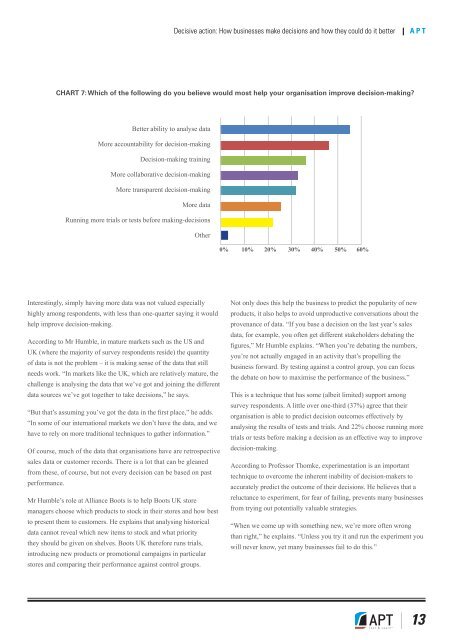Decisive Action - How businesses make decisions
Decisive Action - How businesses make decisions
Decisive Action - How businesses make decisions
You also want an ePaper? Increase the reach of your titles
YUMPU automatically turns print PDFs into web optimized ePapers that Google loves.
<strong>Decisive</strong> action: <strong>How</strong> <strong>businesses</strong> <strong>make</strong> <strong>decisions</strong> and how they could do it better| APTCHART 7: Which of the following do you believe would most help your organisation improve decision-making?Better ability to analyse dataMore accountability for decision-makingDecision-making trainingMore collaborative decision-makingMore transparent decision-makingMore dataRunning more trials or tests before making-<strong>decisions</strong>Other0% 10% 20% 30% 40% 50% 60%Interestingly, simply having more data was not valued especiallyhighly among respondents, with less than one-quarter saying it wouldhelp improve decision-making.According to Mr Humble, in mature markets such as the US andUK (where the majority of survey respondents reside) the quantityof data is not the problem – it is making sense of the data that stillneeds work. “In markets like the UK, which are relatively mature, thechallenge is analysing the data that we’ve got and joining the differentdata sources we’ve got together to take <strong>decisions</strong>,” he says.“But that’s assuming you’ve got the data in the first place,” he adds.“In some of our international markets we don’t have the data, and wehave to rely on more traditional techniques to gather information.”Of course, much of the data that organisations have are retrospectivesales data or customer records. There is a lot that can be gleanedfrom these, of course, but not every decision can be based on pastperformance.Mr Humble’s role at Alliance Boots is to help Boots UK storemanagers choose which products to stock in their stores and how bestto present them to customers. He explains that analysing historicaldata cannot reveal which new items to stock and what prioritythey should be given on shelves. Boots UK therefore runs trials,introducing new products or promotional campaigns in particularstores and comparing their performance against control groups.Not only does this help the business to predict the popularity of newproducts, it also helps to avoid unproductive conversations about theprovenance of data. “If you base a decision on the last year’s salesdata, for example, you often get different stakeholders debating thefigures,” Mr Humble explains. “When you’re debating the numbers,you’re not actually engaged in an activity that’s propelling thebusiness forward. By testing against a control group, you can focusthe debate on how to maximise the performance of the business.”This is a technique that has some (albeit limited) support amongsurvey respondents. A little over one-third (37%) agree that theirorganisation is able to predict decision outcomes effectively byanalysing the results of tests and trials. And 22% choose running moretrials or tests before making a decision as an effective way to improvedecision-making.According to Professor Thomke, experimentation is an importanttechnique to overcome the inherent inability of decision-<strong>make</strong>rs toaccurately predict the outcome of their <strong>decisions</strong>. He believes that areluctance to experiment, for fear of failing, prevents many <strong>businesses</strong>from trying out potentially valuable strategies.“When we come up with something new, we’re more often wrongthan right,” he explains. “Unless you try it and run the experiment youwill never know, yet many <strong>businesses</strong> fail to do this.”13


